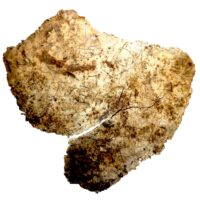 Archaeologists have discovered a unique Christian artifact at the Roman fort of Vindolanda just south of Hadrian’s Wall. It’s a fragmentary lead chalice etched with Christian symbols, the only chalice from this period ever found in Britain.
Archaeologists have discovered a unique Christian artifact at the Roman fort of Vindolanda just south of Hadrian’s Wall. It’s a fragmentary lead chalice etched with Christian symbols, the only chalice from this period ever found in Britain.
The remains of the chalice were discovered in the collapsed walls of a building identified as a 5th/6th century Christian church. It was found in 14 pieces, all in poor condition because it was close to the surface and not buried in the waterlogged anaerobic soil that has preserved thousands of leather shoes and the only Roman wooden toilet seat ever discovered.
Every fragment was densely inscribed with Christian symbols on both inner and outer surfaces. They seem to be random in arrangement and meaning, like doodles.
The marks appear to have been added, both to the outside and the inside of this cup, by the same hand or artist and although they are now difficult to see with the naked eye, with the aid of specialist photography, the symbols have been carefully recorded and work has started on a new journey of discovery to unlock their meanings. The etchings include some well-known symbols from the early church including ships, crosses and chi-rho, fish, a whale, a happy bishop, angels, members of a congregation, letters in Latin, Greek and potentially Ogam.
The academic analysis of the artefact is ongoing with the post-Roman specialist Dr David Petts from Durham University taking the lead on the research and commented: “This is a really exciting find from a poorly understood period in the history of Britain. Its apparent connections with the early Christian church are incredibly important, and this curious vessel is unique in a British context. It is clear that further work on this discovery will tell us much about the development of early Christianity in beginning of the medieval period.”
The chalice fragments are featured in a new exhibition dedicated to Vindolanda’s Christian history. The show opens on Monday, August 31st.